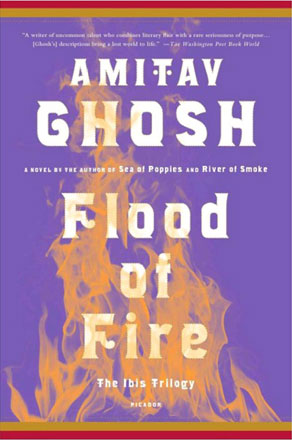Flood of Fire
Amitav Ghosh
New York: Picador, 2016
Pp. 616
This is the final volume of “The Ibis Trilogy”, a masterpiece of historical fiction linking mid-19th century India and China, and named after an opium-transport vessel. In the first book, “Sea of Poppies”, the Ibis is carrying Indian coolies to work on plantations in Mauritius, when a mutiny breaks out. The mutineers escape and are thought to have died at sea but, like other characters in the first two books, they resurface in “Flood of Fire”. Indeed, “the bond of the Ibis was like a living thing, endowed with the power to reach out from the past to override the volition of those who were enmeshed in it”. (p. 439)
Set mainly in China during the First Opium War, “Flood of Fire” adds new layers to Amitav Ghosh’s rendering of the political economy of opium and empire — how it reshuffles power relations, the fate of entire countries and countless lives, bringing ruin to many and enormous riches to a few. Yet, empire also creates new, internationalised communities, like the Chinese who work with the foreign traders, and the offspring of the Indian opium merchants who spend long years in Canton and establish second families there, unknown to those back home. Whereas the British upheld rigid caste boundaries when recruiting their Indian sepoy army to fight their battles for them, the future, as depicted in the novel, is moving towards hybridity and cross-cultural fertilisation.
The opium wars cement the foreign merchant community’s integration into imperial strategy, but also aggravate the contradictions inherent in colonial designs. “Flood of Fire” begins and ends with Kesri, second in command, after a British officer, of a battalion of sepoys, and one of several characters to undergo a decisive transformation in the novel. While soldiering is touted as a glorious undertaking, following Kesri’s career shows the complex and often ugly demands of war. There are panoramic battle scenes as the British navy advances on Canton, but there are more close-ups of the misery that war inflicts on combatants and civilians alike. In Kesri’s case, his tasks of providing for his troops and keeping their morale up, are made more difficult by the British troops’ crude racial discrimination against their Indian counterparts.
As the two sides face off, the Chinese leaders rely on reason, finding it “impossible to conceive that any country would send an army across the sea to force another country to buy opium”, but their rationale is blown away by superior British firepower. (p. 332)
It becomes apparent that battles are not won by honour and bravery, as Kesri once believed, but by a mix of unpredictable circumstances and, above all, who has the best equipment.
When the joint British-sepoy forces leave their ships to engage the enemy on the ground, Kesri finds himself facing ordinary Chinese villagers mobilising with paltry weapons to defend their land from the invaders. “So much death; so much destruction—and that too visited upon a people who had neither attacked nor harmed the men who were so intent on engulfing them in this flood of fire”. (p. 505)
Kesri suffers a moral crisis. Tormented by the realisation that he is not fighting to defend his own land or family as are the Chinese, still his sense of honour dictates that he stick to his oath of loyalty to the British.
Another character to undergo a transformation in thinking is Shireen, widow of Bahram, the Indian merchant who dies in mysterious circumstances in “River of Smoke”. In “Flood of Fire”, she learns that he had been leading a double life for thirty years, and left behind a son in China. Defying her community’s tradition of cloistering women, she decides to travel to Canton to find the son. Once decided: “It was as if a gale had parted the purdahs that curtained her world, blowing away many decades’ worth of dust and cobwebs”. (p. 217)
When the Indian merchants stationed in China question her undertaking, she asks if they think the children they have begotten there will disappear, saying, “it is impossible to bring children silently into this world. They all have voices and some day they too learn to speak”. (p. 565
Meeting Mrs Burnham, who is trapped in a loveless marriage of convenience to one of the most prominent — and unlikeable — British opium traders, Shireen also learns that it is not only in her own country that women’s wishes are subverted by family ambitions and convention.
“Flood of Fire” is filled with intrigue, passion, betrayal, and big and small acts of human kindness. It is also replete with examples of the inhumanity, exploitation, hypocrisy and corruption inherent in empire, which is especially salient in the opium trade and the wars it causes. Watching the battle for Canton, Neel, the most intellectual of all the novel’s characters, ponders: “How was it possible that a small number of men, in the span of a few hours or minutes, could decide the fate of millions of people yet unborn? How was it possible that the outcome of those brief moments could determine who would rule whom, who would be rich or poor, master or servant, for generations to come?” (p. 388)
Obviously, such questions have equal relevance today.
Sally Bland
